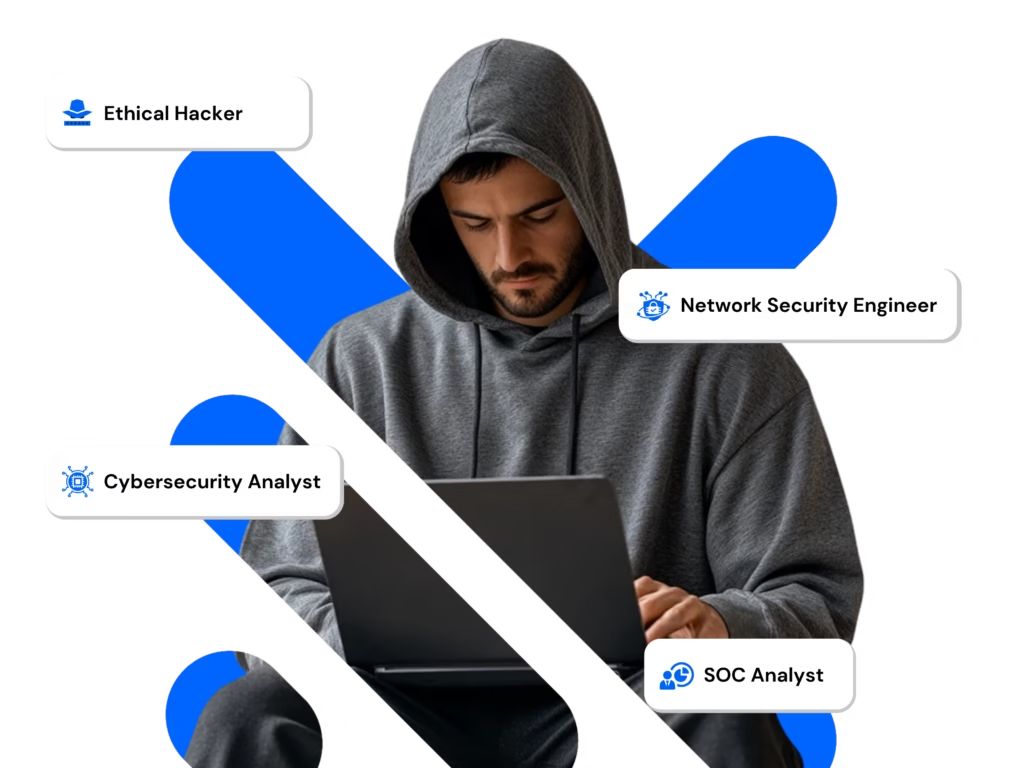
The Certified Ethical Hacker in Dehradun (CEH) certification is a professional credential offered by the EC-Council that validates an individual’s skills in identifying and addressing vulnerabilities in computer systems and networks. It focuses on the techniques and tools used by malicious hackers, allowing certified professionals to think like hackers and effectively defend against cyber threats. CEH certification in Dehradun covers a wide range of topics, including penetration testing, network security, and risk assessment, making it a valuable asset for cybersecurity professionals looking to enhance their expertise and advance their careers in the rapidly evolving field of information security.
Table of Contents
Introduction to CEH Certification
The Certified Ethical Hacker in Dehradun (CEH) certification is one of the most sought-after credentials for cybersecurity professionals today. As cyber threats grow more sophisticated, companies increasingly rely on ethical hackers to secure their systems and protect sensitive data. CEH certification validates the skills needed to identify and address vulnerabilities in networks, making certified professionals valuable assets in preventing cyberattacks.
In this article, we’ll explore what the CEH certification Dehradun covers, the key benefits for professionals, the diverse career opportunities it unlocks, and essential tips for passing the CEH exam in 2024.
What is CEH Certification
The Certified Ethical Hacker in Dehradun (CEH) certification, awarded by the EC-Council, is designed to validate the expertise of individuals in identifying and addressing vulnerabilities within systems and networks. Ethical hackers, commonly referred to as white-hat hackers, use their knowledge and skills to legally infiltrate computer systems, with the goal of uncovering security gaps before malicious hackers can exploit them. By simulating cyberattacks, these professionals help organizations strengthen their defenses and prevent potential breaches.
The CEH v12 in Dehradun, the latest version of the certification, equips candidates with the most up-to-date tools, methodologies, and techniques to stay ahead of evolving cyber threats in today’s dynamic digital landscape. This version reflects the current trends and technologies in cybersecurity, ensuring that certified professionals are prepared to tackle real-world challenges effectively.
History and Evolution of CEH Certification
The Certified Ethical Hacker course in Dehradun (CEH) certification has a rich history rooted in the growing need for cybersecurity professionals as the digital landscape expanded. It was first introduced in 2003 by the EC-Council (International Council of E-Commerce Consultants) as a response to the increasing prevalence of cyberattacks and the demand for individuals capable of identifying and mitigating security vulnerabilities.
The concept of ethical hacking emerged as a critical countermeasure to malicious hacking, and the CEH certification was designed to provide a formal pathway for professionals to acquire and validate these skills. In its early iterations, the CEH certification course in Dehradun focused primarily on the fundamentals of ethical hacking—covering topics like network security, reconnaissance, and system penetration. Over time, as the nature of cyber threats evolved, so too did the certification.
Each new version of the CEH course in Dehradun has introduced updated tools, techniques, and methodologies to reflect the latest trends in cybersecurity. Notable versions include CEH v9, which brought an emphasis on cloud security, and CEH v10, which expanded into IoT (Internet of Things) security, reflecting the growing integration of connected devices in everyday life. CEH v11 introduced concepts related to artificial intelligence (AI) and machine learning in cybersecurity, addressing the increasing complexity of modern threats.
The CEH v12, launched most recently, emphasizes hands-on learning with advanced tools and techniques for penetration testing, malware analysis, and incident response. This version also incorporates a robust focus on practical, real-world scenarios through enhanced labs and challenges, allowing candidates to gain experience in addressing contemporary cybersecurity threats. The evolution of the CEH certification training in Dehradun reflects the constantly shifting landscape of cyber defense, ensuring that ethical hackers stay ahead of malicious actors by equipping them with the most relevant and up-to-date skills in the industry.
Benefits of Obtaining a CEH Certification
Enhanced Career Opportunities
The Certified Ethical Hacker training in Dehradun is a powerful credential that can significantly enhance your career prospects in the field of cybersecurity. Earning this certification qualifies you for a wide range of roles, including penetration tester, security consultant, and network security engineer, across various industries such as finance, healthcare, and technology. By obtaining the CEH certification training in Dehradun, you not only open doors to exciting new job opportunities but also position yourself for career advancement and more specialized roles within the cybersecurity sector.
Additionally, the certification helps you stay competitive and up-to-date in an ever-evolving landscape, ensuring that your skills remain relevant as new threats and security challenges emerge.
Validation of Skills and Knowledge
The Certified Ethical Hacker certification course in Dehradun serves as formal recognition of your expertise in ethical hacking and cybersecurity, offering a credible validation of your ability to identify and address security vulnerabilities within networks and systems. By earning this certification, you demonstrate a high level of proficiency to employers and peers, showcasing your skills in protecting organizations from potential cyber threats. This credential not only boosts your credibility in the cybersecurity field but also provides assurance to companies that you possess the knowledge and capabilities necessary to safeguard their systems against a wide range of security risks, making you a valuable asset in any organization focused on maintaining strong security practices.
Global Recognition
The Certified Ethical Hacker (CEH) certification is a globally recognized credential, making it a highly valuable asset regardless of where you choose to work. Its widespread acceptance across various industries, such as finance, healthcare, and technology, along with its recognition in different countries, ensures that your skills are acknowledged and respected on a global scale.
This recognition not only enhances your job prospects within your current location but also significantly boosts your career mobility, allowing you to pursue opportunities and advance your career in diverse markets and regions around the world. With the CEH certification, your expertise in ethical hacking and cybersecurity is validated internationally, positioning you as a competitive candidate in the global job market.
Increased Earning Potential
The Certified Ethical Hacker (CEH) certification can significantly contribute to higher salaries within the cybersecurity field by validating your expertise in ethical hacking and security practices. This certification enhances your overall value to employers, making you a more attractive candidate for roles that offer competitive pay. CEH-certified professionals are often able to command higher salaries compared to their non-certified counterparts, as the certification reflects a higher level of skill, specialized knowledge, and proficiency in safeguarding organizations against cyber threats. As a result, employers are willing to offer more lucrative compensation packages to those holding the CEH certification, recognizing the advanced capabilities and contributions these professionals bring to their roles in cybersecurity.
Career Opportunities with CEH Certification

Cybersecurity Analyst
As a CEH-certified professional, you can become a cybersecurity analyst, where you’ll monitor networks for security breaches, investigate incidents, and implement measures to protect against cyber threats. This role involves safeguarding an organization’s IT infrastructure by identifying vulnerabilities and responding to security challenges. Additionally, you’ll be responsible for conducting security assessments, performing penetration testing, and analyzing threat intelligence to anticipate potential risks.
Cybersecurity analysts also play a crucial role in developing and implementing security policies, educating employees on best practices, and staying up-to-date with the latest security trends and technologies to ensure robust protection against evolving cyber threats.
Penetration Tester
As a CEH-certified professional, you can work as a penetration tester, where you’ll simulate cyberattacks to find and exploit vulnerabilities in systems, networks, and applications. Your job is to identify weaknesses before malicious hackers can do harm, providing detailed reports and recommendations to help organizations enhance their security. This role involves using various tools and techniques to assess the security posture of an organization, conducting risk assessments, and developing custom scripts to test specific scenarios.
You’ll collaborate with security teams to prioritize remediation efforts and may also assist in creating security policies and procedures. Staying informed about the latest hacking techniques and security trends is crucial, as it enables you to effectively test and secure evolving technology landscapes.
Security Consultant
As a CEH-certified professional, you can become a security consultant, advising organizations on how to protect their IT infrastructure from cyber threats. Your role involves assessing current security measures, identifying vulnerabilities, and recommending solutions to enhance overall security. Security consultants help organizations develop robust security strategies and ensure compliance with best practices and regulations. Additionally, you may conduct security audits, perform penetration testing, and deliver training sessions to raise cybersecurity awareness among employees.
You’ll also be responsible for staying updated on the latest security technologies and threat landscapes to provide informed guidance and tailor security solutions to meet each organization’s unique needs, ultimately helping them build a resilient defense against cyber attacks.
Overview of the CEH Exam
Exam Format and Structure
The Certified Ethical Hacker in Dehradun exam is designed to test your knowledge and skills in ethical hacking and cybersecurity. Here’s an overview of the exam format and structure:
| Number of Questions | The exam typically consists of 125 multiple-choice questions. |
| Duration | You have 4 hours to complete the exam. |
| Question Types | The questions cover a range of topics related to ethical hacking, including network security, penetration testing, and vulnerability assessment. |
| Passing Score | The passing score varies, but it is generally around 60% to 85%, depending on the exam version. |
| Exam Format | The CEH exam is administered through a computer-based testing format, and questions are designed to test both theoretical knowledge and practical application. |
| Content Areas | The exam tests your understanding of various domains such as reconnaissance, scanning networks, gaining access, maintaining access, and covering tracks. |
Important Tips for Successfully Passing the CEH Exam
Understand the Exam Structure
Familiarize yourself with the number of questions, time limit, and key domains. Knowing the exam format helps you prepare strategically. It’s important to understand the types of questions, such as multiple-choice or scenario-based, and the weighting of each domain to focus your study efforts effectively.
Additionally, review the passing score and any exam policies, such as breaks and rescheduling options, to ensure you’re fully prepared on test day.
Hands-On Practice
Use virtual labs or practical environments to practice hacking tools and techniques, as real-world scenarios are key to mastering CEH skills. Hands-on exercises help you understand network vulnerabilities and develop exploitation methods. Working with tools like Metasploit, Nmap, and Wireshark builds proficiency in various attack vectors and defenses.
Simulating cyberattacks and defenses enhances problem-solving abilities, prepares you for real-world challenges, and reinforces your knowledge, boosting confidence for the CEH exam and professional roles.
Study Official Materials
Utilize EC-Council’s official CEH study guides and practice exams to cover all critical topics thoroughly. These resources are specifically designed to align with the exam objectives and provide comprehensive coverage of essential concepts and tools.
Practice exams help you assess your understanding, identify areas for improvement, and familiarize yourself with the question format. Additionally, leveraging official materials ensures you stay updated on the latest exam content and methodologies, giving you a strong foundation for success.
Take Practice Exams
Regularly attempt practice tests to simulate the exam and identify areas where you need improvement. These tests help you gauge your readiness, manage time effectively, and become familiar with the types of questions you’ll encounter. Reviewing your results allows you to focus on weaker areas and refine your study plan accordingly. Consistent practice also reduces exam anxiety and builds confidence, ensuring you’re well-prepared for the actual test.
Focus on Key Domains
Prioritize topics like network security, vulnerability assessment, and penetration testing, as they carry significant weight in the exam. By focusing on these areas, you can enhance your understanding of core concepts that are critical for both the exam and real-world applications. Delving deep into these subjects will not only improve your exam performance but also equip you with essential skills for a career in cybersecurity. Additionally, understanding these topics will enable you to effectively address security challenges and implement best practices in various organizational settings. Make sure to allocate sufficient study time to each topic, incorporating practical exercises to reinforce your knowledge.
Coming Soon: CEH v13 and What It Brings

The Certified Ethical Hacker (CEH v13) certification continues to e volve with the upcoming release of CEH v13, promising new tools, techniques, and methodologies to tackle emerging cybersecurity challenges. Building on the hands-on learning approach of CEH v12, the latest version will enhance skills in areas like ransomware defense, AI-driven threats, cloud security, and IoT vulnerabilities.
By staying updated with CEH v13 course in Dehradun, professionals will be equipped to handle modern cyber threats and maintain cutting-edge expertise, keeping pace with the demands of today’s security landscape. Keep an eye on CEH v13 training in Dehradun for the next level of ethical hacking training.
Explore more on:- Top 10 Ethical Hacking Tools You Should Know
FAQs:-
Is CEH Certification suitable for beginners in cybersecurity?
Yes, while CEH is primarily for professionals, beginners with a foundational understanding of networking and security can pursue it. Basic knowledge or introductory courses in cybersecurity are recommended before attempting the certification.
How can CEH Certification benefit my career prospects?
CEH certification enhances career prospects by validating your skills in ethical hacking, making you eligible for roles such as penetration tester, cybersecurity analyst, and security consultant. It also increases earning potential and job opportunities globally.
What is the passing score for the CEH exam?
The passing score for the CEH exam varies between 60% to 85%, depending on the exam version and difficulty level
Are there any prerequisites for taking the CEH exam?
There are no mandatory prerequisites, but it is recommended that candidates have two years of work experience in cybersecurity or complete an official EC-Council training program before taking the CEH exam.





